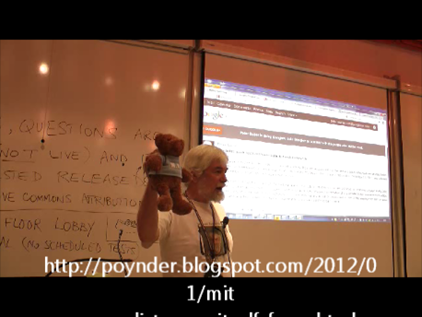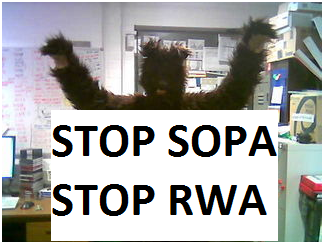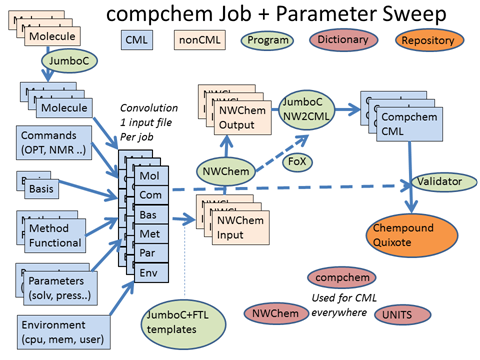I’ve already blogged about the proposed Bill in congress (HR 3699) but it is one of the most serious threats to scientific liberty. YOU must challenge this. I suspect you can only do this formally if you are a US citizen as the mechanism to is write to your representative. [Any info on this would be useful.] Here’s how SPARC puts it:
A new bill, The Research Works Act (H.R.3699), designed to roll back the NIH Public Access Policy and block the development of similar policies at other federal agencies has been introduced into the U.S. House of Representatives. Co-sponsored by Darrell Issa (R-CA) and Carolyn Maloney (D-NY), it was introduced on December 16, 2011, and referred to the Committee on Oversight and Government Reform.
Essentially, the bill seeks to prohibit federal agencies from conditioning their grants to require that articles reporting on publicly funded research be made accessible to the public online.
The bill text is short and to the point. The main point reads:
“No Federal agency may adopt, implement, maintain, continue, or otherwise engage in any policy, program, or other activity that — (1) causes, permits, or authorizes network dissemination of any private-sector research work without the prior consent of the publisher of such work; or (2) requires that any actual or prospective author, or the employer of such an actual or prospective author, assent to network dissemination of a private-sector research work.”
Supporters of public access to the results of publicly funded research need to speak out against this proposed legislation. Contact Congress to express your opposition today, or as soon as possible.
For contact information and details on how to act, see the Alliance for Taxpayer Access Action Center at: http://www.taxpayeraccess.org/action.
It’s a bit difficult for non-US citizens to interpret but basically “the private sector” covers most organizations which are not US government. It certainly covers universities such as Stanford, Harvard, etc. (In Europe we tend to class Universities as the “public Sector”).
If you are US citizen, make your voice known. And tell others.
If you aren’t a US citizen, blog, tweet, mail.
The NIH information resources are one of the marvels of the modern world. I’ve had the privilege of working alongside NCBI and NCI for many years. Their innovation and commitment has been remarkable and the edifice of Pubmed provides a unique resource not only for the US but for the world. I’m on the advisory board of UK PubmedCentral (UKPMC) which draws (and hopefully contributes back) to the enormous resource provided by the NIH/NLM/NCBI.
Very simply, modern medicine draws heavily on access to information.
Put simply: “Open Information saves lives”.
And what the current bill is proposing is that access to information should be reduced so as to preserve the profits of publishers. Read it for yourself: http://www.publishers.org/press/56/. I’ll highlight some bits (some omitted for brevity)
Washington, DC; December 23, 2011— The Association of American Publishers (AAP) and its Professional and Scholarly Division (PSP) welcomed the introduction of the bipartisan Research Works Act, H.R. 3699 as significant legislation that will help reinforce America’s leadership in scholarly and scientific publishing in the public interest and in the critical peer-review system that safeguards the quality of such research.
The legislation is aimed at preventing regulatory interference with private-sector research publishers in the production, peer review and publication of scientific, medical, technical, humanities, legal and scholarly journal articles. This sector represents tens of thousands of articles which report on, analyze and interpret original research; more than 30,000 U.S. workers; and millions of dollars invested by publishers in staff, editorial, technological, capital and operational funding of independent peer review by specialized experts. North American-based science journal publishers alone account for 45% of all peer-reviewed papers published annually for researchers worldwide.
“America’s PSP publishers are making more research information available to more people, through more channels, than ever before in our history. At a time when job retention, U.S. exports, scholarly excellence, scientific integrity and digital copyright protection are all priorities, the Research Works Act ensures the sustainability of this industry.”
The Research Works Act will prohibit federal agencies from unauthorized free public dissemination of journal articles that report on research which, to some degree, has been federally-funded but is produced and published by private sector publishers receiving no such funding. It would also prevent non-government authors from being required to agree to such free distribution of these works. Additionally, it would preempt federal agencies’ planned funding, development and back-office administration of their own electronic repositories for such works, which would duplicate existing copyright-protected systems and unfairly compete with established university, society and commercial publishers.
Journal articles are widely available in major academic centers, public libraries, universities, interlibrary loan programs and online databases. Many academic, professional and business organizations provide staffs and members with access to such content.
More information about the impact of federal regulations on professional and scholarly publishing can be found at http://publishers.org/issues/5/9/
At least this is very clear. Vote either for profit or for access to knowledge. The argument that the quality of research depends on protectionism of an industry is unsupportable. Remember the cry of the publishers in PRISM “Open Access means Junk Science”. Tell that to the Nobel Laureates that run PLoS and the new eLife journal (Wellcome, HHMI, MaxPlanck).
Almost everyone is Scholarly Poor. They have no access to medical articles other than paying 40 USD per day for each one. They are denied access to life-saving knowledge for the greater good of preserving the publishing industry. (In case you didn’t understand the AAP blurb – the industry aren’t being subsidized – they are highly profitable – not surprising, as academics give them the knowledge and then pay them to get it back).
Ask Gilles Frydman (Kosher Frog and creator of American Cancer Online Resources). ACOR has 65000 members. They WANT access to the literature. The free resources are now being taken away from them. Can they just go down to their local university?? Or public library?
And the NIH itself cannot lobby. I’ve been through this before, where the ACS tried to restrict the scope of Pubchem (sic) as it threatened the ACS’s revenues. The NIH had to remain mute. It was up to US to protest, and we did, and we just saved Pubchem. This is even more serious.
We are in the middle of one of the great struggles of human knowledge. Every day we see example sof those trying to widen our horizons and those dragging it back.
For one motive only – profit.
It’s very easy to spread knowledge in the information age. And it’s very easy to build systems that prevent it. It involves money, lobbying and technological control.
Sometimes I think we are winning; other times I think we are losing. If we lose the tensions will become unbearable. Society will fracture.
You have to decide where you stand and make it clear.




